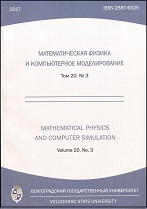|
Mathematics and mechanics
Asymptotic expansion in multiplicative form in the central limit theorem in the case of gamma distribution
V. N. Sobolev
Abstract:
Study of estimation of accuracy of approximations in the Central limit theorem
(CLT) is one of the known problems in probability theory.
The main result here is the estimate of the theorem of Berry — Esseen. Its low accuracy is well known.
So this theorem guarantees accuracy of approximation $10^3$ in the CLT only if the number of summands in the normed sum is greater than 160 000.
Therefore, increasing the accuracy of the approximations
in the CLT is an actual task.
In particular, for this purpose are used
asymptotic expansions in the Central limit theorem.
As a rule, asymptotic expansions have additive form. Although
it is possible to construct expansions in the multiplicative form.
So V.M. Kalinin in [3] received the multiplicative form of the asymptotic expansions.
However, he constructed asymptotic expansions for probability
distributions (multinomial, Poisson, Student's t-distribution).
So very naturally the question arises: how to build multiplicative expansions in CLT?
Secondly, what are the forms of decompositions in CLT in terms of accuracy
approximations are better: additive or multiplicative?
This paper proposes new asymptotic expansions in the central limit theorem which permit us to approximate distributions of normalized sums of independent gamma random variables with explicit estimates of the approximation accuracy and comparing them with expansions in terms of Chebyshev — Hermite polynomials.
New asymptotic expansions is presented in the following theorem:
Theorem 1.
Let random variables $X_{i}$ where $i=1,2,...,n$ have gamma distribution
with mathematical expectation $\frac{k}{a}$ and dispersion $\frac{k}{a^{2}}$
and inequality $nk>1$ is fulfilled.
Then, for $-\sqrt{nk}<x<\sqrt{nk}$, the asymptotic
expansion of the density distribution of normalized sums (2)
can be represented in a multiplicative form
$$
p_{n}(x)=\frac{1}{\sqrt{2\pi}}e^{-\frac{x^{2}}{2}-\frac{x}{\sqrt{nk}}\left(1-\frac{x}{2\sqrt{nk}}\right)}\times
$$
$$
\times e^{\left(1-\frac{1}{nk}\right)x^{2}{\displaystyle \sum_{l=1}^{m-1}}\frac{(-1)^{l+1}}{l+2}\left(\frac{x}{\sqrt{nk}}\right)^{l}{\displaystyle -\sum_{l=1}^{t_{0}-1}}\frac{B_{2l}}{2l}\frac{1}{(2l-1)(nk)^{2l-1}}}+R_{m}(nk,x)\,,
$$
where for $\left|R_{m}(nk,x)\right|$ is true at $-\sqrt{nk}<x<0$
estimate (13), and at $0<x<\sqrt{nk}$ estimate (12).
At $\sqrt{nk}<x$ the density distribution of normalized sums decreases
exponentially fast
when $n\rightarrow\infty$ and correct estimate
$$
\left|p_{n}(x)\right|\leqslant\frac{1}{2\sqrt{2\pi}}e^{-nk\ln\left(\frac{e}{2}\right)-\frac{\theta}{12nk}}.
$$
At $x<-\sqrt{nk}$ is true $p_{n}(x)=0$.
In (13) and (12) the number $t_{0}$ is taken
from conditions
$t_{0}\in\mathbb{N}$, $B_{2t_{0}}>0$ and
$$
\frac{\left|B_{2t_{0}}\right|}{2t_{0}(2t_{0}-1)(nk)^{2t_{0}-1}}<\frac{\left|B_{2l}\right|}{2l(2l-1)(nk)^{2l-1}}
$$
for all $l\in\mathbb{N}$ except maybe one.
Comparing multiplicative asymptotic expansion from theorem 1 with the additive asymptotic expansion from [5], we obtain that multiplicative asymptotic expansion of the density of normalized
the sums in the case of gamma distribution give a much greater
accuracy numerical calculations are compared with asymptotic additive expansion provided a much smaller number of calculations.
The author would like to thank Vladimir Senatov for setting the task and paying attention to this work.
Keywords:
central limit theorem, asymptotic expansions, gamma distribution, approximation accuracy, estimates of the convergence rate, polynomials of Chebyshev — Hermit.
Citation:
V. N. Sobolev, “Asymptotic expansion in multiplicative form in the central limit theorem in the case of gamma distribution”, Mathematical Physics and Computer Simulation, 22:1 (2019), 12–23
Linking options:
https://www.mathnet.ru/eng/vvgum246 https://www.mathnet.ru/eng/vvgum/v22/i1/p12
|

|




 Contact us:
Contact us: Terms of Use
Terms of Use
 Registration to the website
Registration to the website Logotypes
Logotypes








 Citation in format
Citation in format 